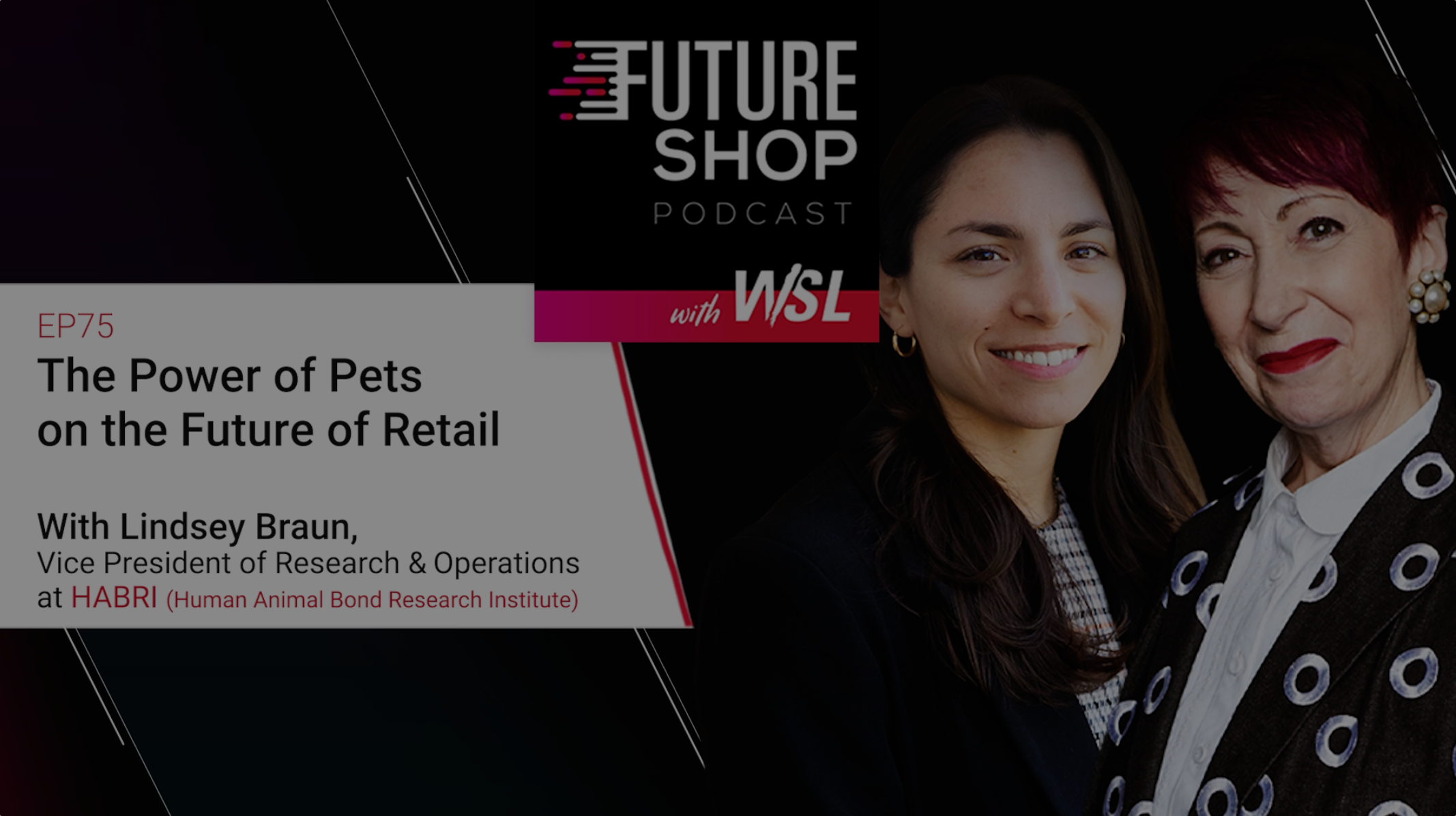In this episode:
Wendy Liebmann talks to Lindsey Braun, Vice President of Research & Operations at HABRI (the Human Animal Bond Research Institute) about the power of pets to positively impact the health and wellbeing of people – and retail.
They discuss:
- The science behind the pet–human connection and the power pets have to change lives. (It’s real.)
- How having a pet can improve overall health and wellbeing, including mental health, autism, and medical outcomes
- With the aging of America, the role pets can plan in reducing loneliness, even caregiving
- The positive effects of pet friendly workplaces
- Why retailers such as Walmart, Petco and others continue to enhance their pet services
Don’t miss upcoming episodes, subscribe to our podcast with your favorite app.
Watch the video episode:
Wendy 00:09 Hello everyone, I'm Wendy Liebmann CEO and chief shopper WSL Strategic Retail, and this is Future Shop. This is where I talk to innovators disruptors iconic class about the future of retail. Today, my guest is Lindsey Braun, she is the Vice President of Research and Operations at HABRI. HABRI is the Human Animal Bond Research Institute. Now, I heard a loud uh? from the audience, you're wondering what this has to do with the future of retail? Well, don't switch off into new hear more. Because one of the things that we know at WSL in all the decades, yes, decades of doing our How America Shops® research, is it the category and its shoppers has been one of the most important leading indicator categories, in all our research. Why you might say, well, it actually reflects the mindset, the sentiment and the spending of the American shopper, how they are spending, not just for pets, but for many other categories. Wendy 01:17 So let me just give you a couple of examples from our How America Shops® research. Did you know that pet owners are twice as likely to buy natural and homeopathic remedies? Not just for their pets but for themselves? So if you're in the natural and healthcare business, you need to know about pet owners. Did you know cat owners are twice as likely to use curbside pickup than non pet owners? So if you are very interested in buy online pickup at the curb, pickup in store, you need to understand pet owners. Did you know that two thirds of pet owners made a purchase on social media in the past three months, versus non pet owners? Not just for pets, for many things. And last but not least eight out of 10 pet category buyers, pet owners actually pay for membership to services such as Amazon Prime or Walmart Plus, to get that faster delivery, much more than non pet owners. So eight out of 10 do that, versus six out of 10 non pet owners. So all of a sudden, it puts pet owners and the pet category in a different context. It's not just about if you're in the pet category, if you sell pet products, but rather who this person is to owns a pet, and the role they play in bringing traffic to your stores online to other categories. So that's why we're here today. After all that background and drumroll, Lindsey, welcome to Future Shop. Lindsey 02:57 Thank you for having me. Wendy 02:58 Tell us a little bit about HABRI and the work you do there Lindsey 03:03 Absolutely, HABRI, the Human Animal Bond Research Institute, we fund scientific research into the health benefits of the human animal bond that mutually beneficial relationship between people and companion animals that positively influenced the health and well being a fool. And we also work to educate the public about that research. And we advocate for policies that help society become more pet friendly and to help keep people and pets together to keep that bond strong and to help society become more healthier. Wendy 03:34 We saw this through COVID, where people actually went out and bought a cat or other pet for a pound. What is it about having a pet that supports happy, healthier or happier, healthier life that you've seen in in your research? Lindsey 03:54 There's so much research out there from dating back from the 70s and 80s. And it's been growing ever since. It's really rooted in in physiologically what's happening in our brains when we interact with pets. That lends to other benefits. So we know from research, that when we interact with a pet, it could be our own pet or therapy animal for example, we see a release in the bonding hormone, also known as oxytocin, which quiets our blood pressure inhibits stress hormones, which is cortisol and makes us feel comfortable and safe. And so that lends to benefits from reducing stress to helping have healthier hearts. We know from the research that pet owners are more likely to live longer, they're more likely to recover from a significant cardiovascular event. You know, dogs are wonderful motivators to keeping us physically active which lends to other benefits and reduces likelihood of obesity. And then emotionally we know that pets are serving as very important so because of social support, which lends to mental health benefits, so we know that, you know, on the physical side, they can help buffer stress. But they can also provide a sense of routine and purpose that's really critical to, especially for people managing a long term mental illness, to keeping us in routines, and to boosting our confidence and kind of helping us avoid rumination and keeping us active in our daily lives. And so kind of there's a ton of research on various populations, children with autism, older adults, veterans with post traumatic stress, you know, there's a lot of various ways that the human animal bond can be beneficial to our health and wellness that's really backed by scientific evidence, just to know that there's a lot of great research out there is super important because it can be very beneficial from in terms of supporting policies, and helping people just, you know, take better care of their pets as well. Wendy 05:59 You know, I had two dogs growing up Susie, who was an English sheepdog. I had Jake who was a golden Labrador. I had Whiskey, who was my black and white cat. There was a brand called Black and White Scotch. I had budgerigars, I even had Hugh, the iguana, but that was grown up, that was left over from a boyfriend. As you were talking about this, I was thinking, does it matter? What kind of pet? Or is this the research? The science show that it could be any pet, any type of animal or bird or whatever, that or equine or whatever they are, that could deliver these sort of benefits? Lindsey 06:38 Yeah, I mean, I think it really comes down to you know, the right pet for the right person or family. There's a lot of research on dogs, a lot of research on horses, a lot of research on cats, or growing research on cat, small animals, super beneficial in classroom settings, or for young children, teaching them empathy and responsibility. So it definitely, you know, doesn't necessarily have to be one specific type of animal. But we find that in terms of just preparing pet owners for the greatest success with the strongest bond, it has to do with just what is the care associated with that type of animal? And are you equipped and prepared to an end? Does that meet your expectations? Right? Like, if you're a traveler, you know, and you want a dog like, and that dog come with you? Wendy 07:26 So what was it that you saw about COVID? And that shut in period that drove people to acquire a pet? And then what is it the challenge of taking care of pets and maintaining that benefit as we move on? Lindsey 07:44 Yeah, I think with COVID, obviously, many of us saw ourselves all of a sudden at home, you know, we were spending a lot more time, hopefully those fortunate enough working from home, where, you know, we know that one of the barriers to pet ownership is time. And people finally, all of a sudden had more time. So I think that's really what drove folks finally getting a pet. And also just knowing like, there's a lot of a lot of people are aware of the social and emotional benefits of having a pet that companionship, right? If they're a little lonely, isolated, there's ton of research to show that pets can be super beneficial for keeping us connected and reducing loneliness. So I think that was kind of all where it stemmed from people, you know, they had the time they were at home, they could spend more time with that pet. Wendy 08:39 And you will also refer to children before and I think about that sort of locked in or that tighter, smaller world that that children had to live with, particularly for those three or four years. And that having a pet as part of that comfort was something that that many people have talked about. And in that time, you also talked about things like autism, and I know some of the work you you've done. So I must tell everybody, that's an amazing website, you need to go on to the HABRI website to see all the various papers that have been written by people with cancer children with autism, because you said mental health. Talk a little bit about that, at scientific research that supports why is it that those conditions in particular benefit from having a pet in the in the household or even as a as a therapy dog or therapy pet? Lindsey 09:37 Yeah, I think, you know, a lot of the theories around that pets are really non judgmental. And so and they're great listeners. And so for children especially, and their development, in the presence of a pet can really boost their confidence. Teach them empathy and responsibility and particularly for children with autism, we see, they can kind of be a very calming presence. Even cats, we have one study that we funded on shelter cat adoption for families of children with autism. And we found that the children with autism really saw decreases in separation anxiety, and increases in empathy. So really good benefits from various types of pets. And I know, there's other research that we've funded, even looking at pet dog ownership long term, and how that can have an impact on they actually found that pet dog, families with a pet dog, and saw improvements in family functioning, again, getting like they, they provide us with that routine and motivation, even with COVID, right, like we needed us a sense of, we needed a sense of normalcy and pets really help with that. Wendy 10:52 And as we see, you know, as the US population gets older, not just in the US, but actually around the world. And more people are living alone. That role of pets for older people, or single household people who've seen it, we just finished a new piece of research around shifting demographics. And in that work, we're looking at the aging of America, both active aging, people still climbing mountains, and those who need greater care in their households. So thinking about the role of pets, as our population changes as well, it's not just the kids, right? It's also for the older populations. Lindsey 11:36 Yeah, and especially enabling people to keep their pets in those transitions. So as older adults age, and perhaps they change their housing situation, how can we better support the human animal bond by helping them keep their pets when they when they maybe move into assisted living, for example, because we know how beneficial pets can be. Wendy 11:59 It's really interesting. Yeah, that's a really interesting comment, because talking to some colleagues, you know, in terms of that, and sort of role of caregiving, and then when people move into assisted living, and that break of losing their, you know, their familiar territory, their home, their neighborhoods, their communities, and then if they're not allowed to take their beloved pet with them, that becomes an issue two, because it's another break from the normalcy that you talked about before. Right? Exactly. Yeah. Are you seeing in the way people are thinking about this research and using it in the in the broader world of your broader community, that whether it's medical facilities, health care facilities, you know, living facilities, new communities, that those sort of rules are now starting to change a bit with the sort of scientific knowledge? Or is we are we still in that place that no pets allowed kind of thing? Lindsey 12:59 I do think that more as we are able to share the research and how beneficial it is, you know, we want to stop just we want to talk to human health organizations and professionals, are those serving those health care providers, not just we tend to be pre insulated, sometimes with our community of the pet care community and others doing great programming. But yeah, so I think we've seen an increase as as people are acknowledging, especially with COVID, and everything that happened that the human animal bond is super important to human health. And so there are some cheap shifts in policies, I think you'll there's still a lot of work to be done, especially when it comes to rental housing. We're partnered with Michelson found animals foundation on the pet Inclusive Housing initiative where we feel did survey data, but really demonstrated that while many of you know many owner operators of rental housing are pet friendly in some way, there are significant restrictions on what it means to be pet friendly, that create barriers for pet owners making a rental housing for pet friendly rental housing, difficult to find Wendy 14:07 yeah, Lindsey 14:08 not always affordable. But also there's a lot of wonderful programming out there where, you know, therapy, um, organizations are coming in and visiting assisted living facility or nursing homes, hospitals, other places where people are living, either temporarily or permanently. That's really acknowledging the human animal bond and in giving people access to it, even if they're not necessarily pet owners. Wendy 14:30 Yeah, it's interesting. My cousin Eric, who lives in Portland, who was a nurse practitioner. Actually, that's what he does in his retirement. You know, he takes therapy dogs into facilities like you described, which I think is really interesting when we're thinking about building healthier communities, whether it's for long term care or for every day, and we do think even in the purchase of housing, you know, particularly in a city like New York City, or Um, where you know, you can have all the all the financials you want, but you know, you want to bring your pets with you in some places, they say sorry, no pets, or no big dogs or No, whatever it is. And I do think valuable the work you're doing to prove that actually pets makes us much nicer people, mentally physically, you know, empathetically, connect us in our communities. Lindsey 15:23 I mean, it's really like there's research to show that pet owners are more likely to get to know their neighbors, you know, when you think about it as simply as like, oh, you call on your neighbors to like feed your fish while you're away for the weekend. And you're naturally through those favorite exchanges, or just going out into the community, you're walking your dog or whatever it may be, you're more likely to be connected in that way. So they do foster really better communities, which is what we need Wendy 15:50 More than ever, I think, and this, think about stress and anxiety. And you've already talked about this, but it's one of the things we saw in our we saw first saw in our research, our power shops research several years ago about, you know, stress and anxiety being two of the biggest obstacles, people say, to living a healthy life, and short of you know, popping a pill or, you know, whatever. The the fact that you know, have a pet, borrow a neighbor's cat. What about workplaces? I mean, I do wonder, particularly, you know, as we talked about COVID, and people were at home, and now people are getting back to the office in some numbers. How do we have to think about healthy workplaces? And the role of pets in those places? What's your research tell you about that? Lindsey 16:38 Yeah, there's a lot of great data and information out there about the benefits of pet friendly workplaces generally. You know, it's not necessarily a new concept of like allowing pets to come to the office, per se. And there's research to show that those environments are more collaborative, more communicative. But it's not just pets in the office, we've found through our survey research that we did with nationwide, that kind of inclusive workplaces where it's a whole host of ways to policies that an employer can can institute related to pets, that there's a whole host of benefits associated with implementing those policies. So it's yes, it's a it's potentially allowing pets in the workplace. We understand not everyone can do that, for safety reasons or for a number of reasons. But it's allowing time off to care for a new pet or a sick pet, providing pet sitting services, having an event where you hosting pet meal for your pet to work day or week. I know that's coming up in June, but also offering a pet health insurance policy, all those things can really be beneficial from a, you know, attracting talent retaining talent standpoint, you know, many younger pet owners or younger people are pet owners of the largest pet owning cohort know millennials and Gen Z. And they want their employers to demonstrate that they care about their family members, right their pets. And so just, you know, attraction retention engagements in the workplace, better relationships between supervisors and employees as well, which is very critical from a retention standpoint. So good things are happening for both the employer and the employee, when when workplaces are encouraged, engaging on pet friendliness and pet inclusivity. You know, a lot of our donors and supporters are, you know, they have pet friendly offices or workplaces. And they have they make their policies and resources available. But we created a little handbook called The Woofice. It's available on our website, just giving some basic best practices, when it comes to getting buy in from your community about friendly workplaces to just how to do it or what you know, policy considerations. Wendy 19:06 You could just see the extraordinary benefits of this. Culturally wise, I think that you quoted a number about the how the healthcare savings Oh, yes, that's a stunning number. Please tell us about this. Wow. Lindsey 19:26 So we have an economic analysis that we conducted through research through economists at George Mason University, through we commissioned with our supporter Banfield Pet Hospital, on the health care cost savings and pet ownership. This is also available on our website. But essentially we compiled all of the research that pointed to various health benefits of pet ownership. And our economists here that research with publicly available economic health care cost savings data So it wasn't you know, it's not it's it's pretty conservative, its approach and methodology. But we were able to show from peering with that data, that there's a annual health care cost savings of $22.7 billion associated with pet ownership in the US. Wendy 20:17 Say that again, that's a very big number... Lindsey 20:20 $2.7 billion health care cost savings on an annual basis Wendy 20:24 I know that health care costs in this country are way more than that with zeros in the trillions. But it does say to you, there's so many ways to look at this and think about it, whether I'm a, you know, a corporation, or I'm a family, whether I'm a community, or whether where we live most of our lives and retail, and the opportunity around that Lindsey 20:50 There's a whole host of research on the benefits of paths for human health and wellness. By tapping into that by by sharing that research by really trying to support pet owners, whether it's providing them with services or products in your in your stores, or just providing your employees with benefits related to pets, you know, you can really honor the bond and connect with people that 66% of US households own at least one pet. And that's especially true for the younger generations who are going to be belongings, their shopping. And you know, 98% of pet owners consider their pets to be an important member of family and pet owners are incredibly fond to their pets, you know, there. By acknowledging that relationship and sharing the research. We know from our survey research to that the more knowledgeable pet owners are of the health benefits of pets, the more likely they are to take better care of those pets and spend. So there's just you know, I think there's definitely a lot to gain from honoring the bond by better serving your pedaling constituents, which is ultimately going to be a majority of your, your consumer interest holders. Wendy 22:00 It does make you smile, right that it is that thing. And when I knew I was going to interview that's why I was sort of thinking, Oh, think about all the guests I've had growing up right I look at Walmart just has added vet services and unlimited virtual service to their Walmart Pet program. You know that in addition to offering men and mammograms services, so somewhere along the line, there's the largest retailer in the US and the world, looking at both sides of that story, right, and the whole family, and the benefits, both emotional and financial. So now you have to tell me, I told you about all my pet's names. My understanding is you have a dog? Lindsey 22:45 Yeah, his name is Cliff. He's nine. He was my first baby. Since having him we've moved cities. We've had a son, who's 18 months old. But and cliff is very much a part of our family. And it's been so fun having him we adopted him, I take him to dog parks all the time. Still walk him. It's part of my day that I look forward to for sure. Wendy 23:11 Now, the second question about Cliff is what's his favorite place to shop? Lindsey 23:17 Since we have a baby, a toddler, it's all about convenience. We and Cliff would agree. We love to access our Pet Supplies generally either online, in the store, at the grocery store where we're already shopping, it's It runs the gamut. And I'm not necessarily he's not necessarily attached to just one place. So I think that really speaks to a lot of families out there. They want convenience and they want to be able to access their pet supplies where they're already suffering. Wendy 23:50 Well. The other thing I will tell you is that my favorite new retail concept by Leon, Nan regardless of category, even though I do not have a pet at the moment we do not have a pet at the moment is PETCO's new flagship store, which is down in Union Square in New York City, which is this extraordinary place right in the window you can see them washing and grooming the pets that are a vet services they have amazing offer of healthy food. I mean, literally anything I would want as a two legged person in the end they've got snakes and birds and you name it to your point matching the pet to the person I think is incredibly powerful. And so much of the research that you do, really does talk to not just having a pet or owning a pet but those emotions that come with it and building communities and building healthier communities. So tell us what your website address just to make it easy so everybody can jump on and do some homework. Lindsey 24:53 Thank you for asking. It's habri.org, H-A-B-R-I-dot-O-R-G Wendy 24:58 Okay, they're gonna do made my heart warm, I'm now going to go and get my neighbor's dog. So thank you. Thank you for that. It's been a pleasure. Lindsey 25:06 Thank you so much Wendy. Wendy 25:08 You know, in these times when we are trying very hard to find opportunities to grow our businesses, sometimes we need to look in, in areas and in ways that aren't literally directly align to the aisle were in for the store were in or the category were in, sometimes we need to step back. And as you've heard me say, 1000s, and 1000s, and 1000s of times, look at the shopper, understand their lives, their lifestyle, their mindset, their sentiments, for other opportunities. And I think what Lindsey told us all today and sharing our own How America Shops® research is that if you look at this particular group of shoppers, around this particular category, so much opens up in terms of insight, knowledge and actionable opportunities. It's how do I find the right shopper that I can grow my business with, even if it's in a totally different category, by delivering that kind of emotion, empathy sentiment that they will respond to, and particularly when we're all focused very much on happier, healthier lives, communities, families, all of the above. This is a segment of the population, two thirds of the population who are actually in this mindset to understand the value of having a pet and do certain things as a result of that and not just about buying products. So think about it differently. Push the future of retail, and we'll see in the future. Cheers for now.



















